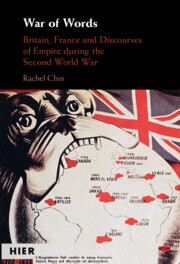Book contents
- War of Words
- War of Words
- Copyright page
- Dedication
- Contents
- Acknowledgements
- Abbreviations
- Introduction
- 1 From the Dunkirk Evacuations to the Franco-German Armistice
- 2 ‘The Real Question at Issue’
- 3 A Necessary Tragedy? The British Bombardments of the French Fleet at Mers El-Kébir
- 4 Vichy, the Free French and the Battle for Imperial Influence at Dakar in September 1940
- 5 Promises of Independence
- 6 Operation Torch
- 7 Independence on French Terms
- 8 Holding On to Empire
- Conclusion
- Bibliography
- Index
7 - Independence on French Terms
The 1943 Lebanese Parliamentary Crisis
Published online by Cambridge University Press: 07 July 2022
- War of Words
- War of Words
- Copyright page
- Dedication
- Contents
- Acknowledgements
- Abbreviations
- Introduction
- 1 From the Dunkirk Evacuations to the Franco-German Armistice
- 2 ‘The Real Question at Issue’
- 3 A Necessary Tragedy? The British Bombardments of the French Fleet at Mers El-Kébir
- 4 Vichy, the Free French and the Battle for Imperial Influence at Dakar in September 1940
- 5 Promises of Independence
- 6 Operation Torch
- 7 Independence on French Terms
- 8 Holding On to Empire
- Conclusion
- Bibliography
- Index
Summary
Following the Torch operations, de Gaulle faced an escalating imperial crisis in the Levant. Indigenous nationalist groups demanded that de Gaulle follow through on his independence promises. These demands placed the British-Gaullist relationship under increasing pressure. This chapter explores the first of two major crises that erupted in the Levant between 1943 and 1945. Following nationalist victories in the November 1943 elections, French colonial official Jean Helleu arrested the newly elected Lebanese leadership in a bid to preserve French influence.
The arrests were criticised in the local, regional and global press. In the Arab world, the Egyptian press brandished the Atlantic Charter’s promises of the right of self-determination, much as anti-imperial nationalists had drawn on American President Woodrow Wilson’s Fourteen Points in 1919. In Britain, the press called on its own officials to back independence demands to uphold British honour, which had been compromised thanks to French intransigence.
This episode also highlighted the contradictions between maintaining British regional prestige and preserving the public face of the British-Gaullist relationship. British Foreign Office officials argued that intervening on the side of the Levantine nationalists would jeopardise British influence in Egypt, Palestine and Iraq. Publicly backing the French position, however, would destroy British regional influence.
- Type
- Chapter
- Information
- War of WordsBritain, France and Discourses of Empire during the Second World War, pp. 204 - 229Publisher: Cambridge University PressPrint publication year: 2022

